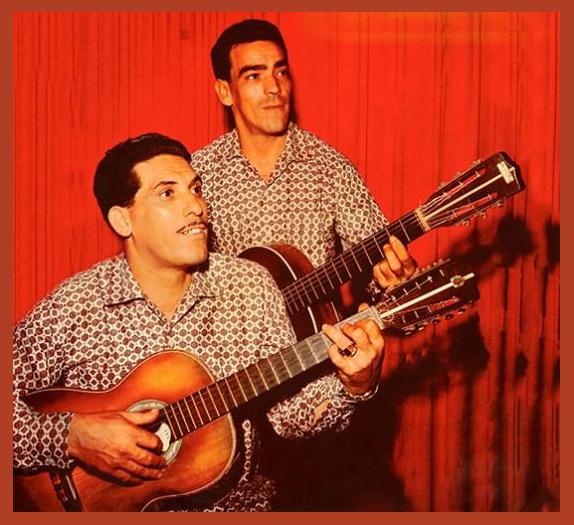 Zé Batuta e Batutinha
Zé Batuta e Batutinha
Zé Batuta e Batutinha: A Musical Journey of Controversy and Acclaim
In the vibrant realm of Brazilian popular music, the legendary duo Zé Batuta e Batutinha stands as a polarizing force. Their iconic song, "A Mulher e a Pinga," has captivated audiences for decades, eliciting both admiration and censure.
Origins and Early Challenges
Zé Batuta (José Carlos de Souza) and Batutinha (José Antônio da Silva) were born in the humble neighborhood of Vila Isabel in Rio de Janeiro. Their musical aspirations began in the local streets, where they honed their skills as street performers.
Their early years were marked by financial struggles and legal troubles. Zé Batuta was imprisoned for drug possession, while Batutinha faced charges of vagrancy. Undeterred, they continued to pursue their music, finding solace in the rhythmic beats of samba and the raw lyrics of popular culture.
Rise to Prominence and "A Mulher e a Pinga"
In 1965, Zé Batuta e Batutinha released their debut album, which included the controversial single "A Mulher e a Pinga." The song's racy lyrics and catchy melody sparked widespread outrage among conservative audiences, who decried its perceived glorification of alcohol and promiscuity.
Despite the backlash, "A Mulher e a Pinga" became a massive hit. Its raw honesty and infectious rhythms resonated with the marginalized communities of Brazil, who saw themselves reflected in the duo's unvarnished storytelling.
Controversy and Censorship
Zé Batuta e Batutinha's provocative lyrics and lifestyle made them targets of government censorship during Brazil's military dictatorship. Their concerts were often banned, and their songs were blacklisted from radio airplay.
Undeterred, the duo continued to perform, becoming symbols of resistance against oppression. Their songs became anthems for the poor and downtrodden, inspiring a sense of defiance and hope.
Musical Legacy and Influence
Despite the challenges they faced, Zé Batuta e Batutinha left an indelible mark on Brazilian music. Their unique blend of samba, funk, and street culture influenced countless subsequent artists, including Jorge Ben Jor, João Gilberto, and Caetano Veloso.
Their music transcended social boundaries, becoming a soundtrack for the urban underclass and a source of inspiration for artists and activists alike.
Discography
* 1965: Zé Batuta e Batutinha (debut album)
* 1966: Não Tem Baixaria
* 1967: O Som da Rebeldia
* 1968: Vamos Falar de Negócios
* 1969: É Proibido Proibir
Members
* José Carlos de Souza (Zé Batuta) - vocals, percussion
* José Antônio da Silva (Batutinha) - vocals, guitar
In the vibrant realm of Brazilian popular music, the legendary duo Zé Batuta e Batutinha stands as a polarizing force. Their iconic song, "A Mulher e a Pinga," has captivated audiences for decades, eliciting both admiration and censure.
Origins and Early Challenges
Zé Batuta (José Carlos de Souza) and Batutinha (José Antônio da Silva) were born in the humble neighborhood of Vila Isabel in Rio de Janeiro. Their musical aspirations began in the local streets, where they honed their skills as street performers.
Their early years were marked by financial struggles and legal troubles. Zé Batuta was imprisoned for drug possession, while Batutinha faced charges of vagrancy. Undeterred, they continued to pursue their music, finding solace in the rhythmic beats of samba and the raw lyrics of popular culture.
Rise to Prominence and "A Mulher e a Pinga"
In 1965, Zé Batuta e Batutinha released their debut album, which included the controversial single "A Mulher e a Pinga." The song's racy lyrics and catchy melody sparked widespread outrage among conservative audiences, who decried its perceived glorification of alcohol and promiscuity.
Despite the backlash, "A Mulher e a Pinga" became a massive hit. Its raw honesty and infectious rhythms resonated with the marginalized communities of Brazil, who saw themselves reflected in the duo's unvarnished storytelling.
Controversy and Censorship
Zé Batuta e Batutinha's provocative lyrics and lifestyle made them targets of government censorship during Brazil's military dictatorship. Their concerts were often banned, and their songs were blacklisted from radio airplay.
Undeterred, the duo continued to perform, becoming symbols of resistance against oppression. Their songs became anthems for the poor and downtrodden, inspiring a sense of defiance and hope.
Musical Legacy and Influence
Despite the challenges they faced, Zé Batuta e Batutinha left an indelible mark on Brazilian music. Their unique blend of samba, funk, and street culture influenced countless subsequent artists, including Jorge Ben Jor, João Gilberto, and Caetano Veloso.
Their music transcended social boundaries, becoming a soundtrack for the urban underclass and a source of inspiration for artists and activists alike.
Discography
* 1965: Zé Batuta e Batutinha (debut album)
* 1966: Não Tem Baixaria
* 1967: O Som da Rebeldia
* 1968: Vamos Falar de Negócios
* 1969: É Proibido Proibir
Members
* José Carlos de Souza (Zé Batuta) - vocals, percussion
* José Antônio da Silva (Batutinha) - vocals, guitar